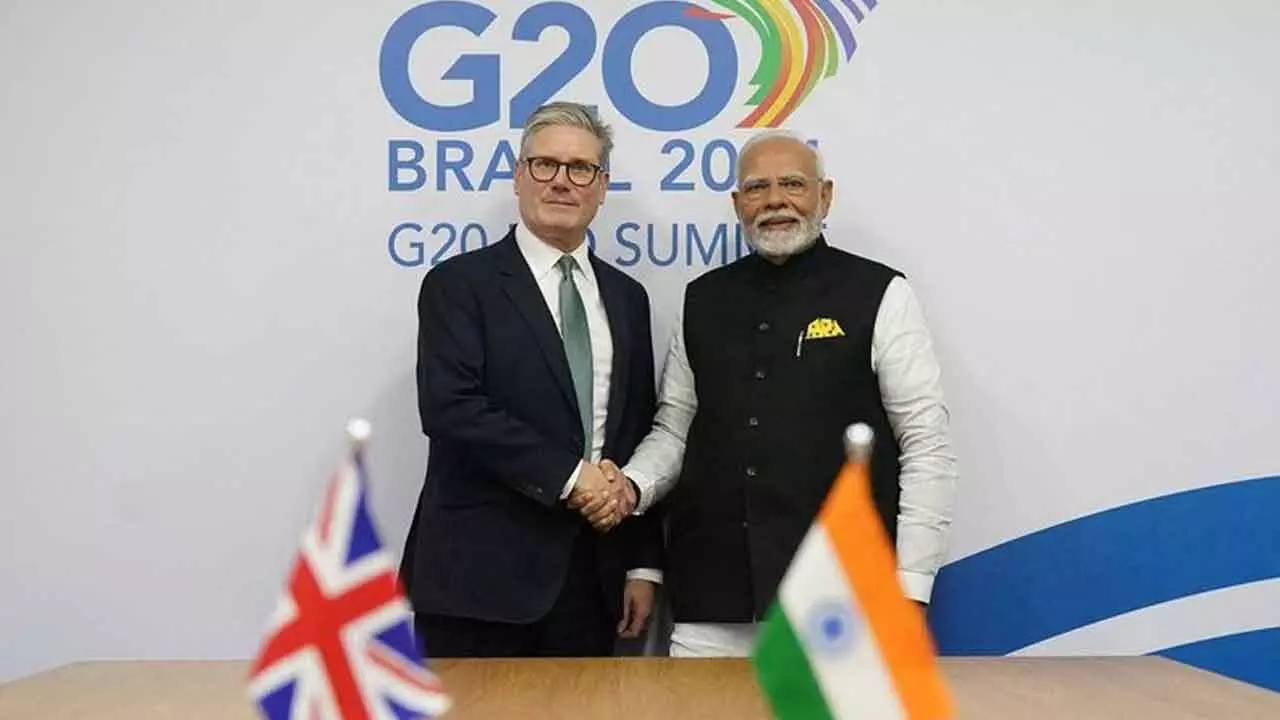India-UK Seal Landmark Free Trade Deal, Target $120 Billion Trade by 2030
PM Modi's UK visit culminates in a major trade deal, offering duty-free access for Indian goods and cheaper British imports. Explore the economic impact.
Modi-Starmer Summit: Beyond FTA, Focus on Security, Education, and Maldives Reset

In a significant diplomatic and economic stride, Prime Minister Narendra Modi's visit to the United Kingdom today culminated in the signing of a long-anticipated Free Trade Agreement (FTA) with UK Prime Minister Keir Starmer. This landmark deal, the UK's most substantial since its departure from the European Union, is poised to reshape bilateral trade, targeting an ambitious doubling to $120 billion by 2030.
The agreement, formally concluded after three years of negotiations on May 6, 2025, aims to dismantle trade barriers and foster greater economic cooperation. A key provision grants 99% of Indian products duty-free access to the UK market, encompassing a wide array of goods including labor-intensive sectors like leather, footwear, and clothing. Conversely, the deal will make British imports such as whisky and cars more affordable in India through significant tariff reductions.
Beyond trade, the two nations also formalized a Double Contribution Convention, offering a crucial exemption for employers of Indian workers from paying social security contributions in the UK for up to three years. This measure is expected to ease the movement of skilled professionals and save an estimated $463 million (approximately Rs 40 billion) annually for Indian workers and their employers.
During his fourth visit to the UK since 2014, Prime Minister Modi engaged in comprehensive discussions with Prime Minister Starmer, extending beyond trade to encompass critical areas such as health, energy, education, and security. Both leaders emphasized strengthening the comprehensive strategic partnership.
Key Economic Highlights of the FTA:
♦ Expanded Market Access: 99% of Indian exports will gain duty-free access to the UK.
♦ Reduced Tariffs: Indian duties on British whisky will fall from 150% to 75% immediately, further decreasing to 40% over ten years. Tariffs on certain UK-made automobiles will drop from over 100% to 10% under a quota system.
♦ Boost for Key Sectors: Indian sectors like textiles, footwear, gems and jewelry, and auto components are set to benefit, while British companies like Diageo (whisky) and luxury car manufacturers anticipate significant gains in the Indian market.
♦ Professional Mobility: Easier entry and temporary access for Indian professionals, including chefs and yoga instructors, are included.
♦ Government Procurement: UK firms will gain access to Indian federal government procurement tenders in non-sensitive sectors worth over $240 million (Rs 2 billion).
While the Indian cabinet has already approved the deal, it awaits ratification by the British Parliament to officially come into effect. Industry experts anticipate full implementation within approximately one year following the signing.
Current bilateral trade between India and the UK stood at $21.34 billion in 2023-24, an increase from $20.36 billion in 2022-23. India's exports to the UK reached $14.5 billion in 2024-25, a 12.6% increase, while imports grew by 2.3% to $8.6 billion. The UK remains the sixth-largest investor in India, with investments totaling around $36 billion. Over 1,000 Indian companies operate in the UK, employing approximately 100,000 individuals and investing a total of $2 billion.
Following his engagements in London, Prime Minister Modi is scheduled to travel to the Maldives at the invitation of President Mohamed Muizzu. This visit is seen as a crucial step towards resetting ties between the two nations after a period of strained relations.

